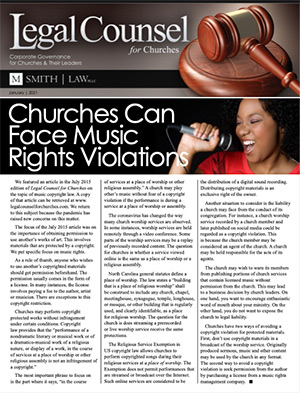The business of running a church includes managing its risks and seizing available opportunities. It is crucial to recognize, every choice church leaders make includes potential consequences. In each instance, it is advisable for church leaders to seek knowledgeable counsel before making big decisions.
It is important to consider the potential outcomes of a transaction before entering into a business arrangement. Here are some scenarios when church leaders should consult with their lawyers before getting too far into the discussions.
Negotiating a Business Loan
Churches borrow money for a number of reasons. Sometimes the loan is for an expansion of the church building, purchase new property, make needed repairs or refinance an existing debt. A properly negotiated loan can be advantageous for the church. On the other hand, a poorly structured loan can leave the church with high costs, unreasonable covenants, limited options and severe restrictions.
A debtor’s counsel can be a valuable member of the church’s finance team. Your lawyer should help the leadership understand the terms of the agreements. Banking terms of art may not have the common meaning you’d normally associate with a clause. Your attorney can explain each contract provision and, if necessary seek better terms that will benefit the church.
Signing a Contract
Churches enter into contracts for all kinds of purposes. If you look around your office, you may find contracts for office equipment, vehicle leases, credit cards, banking, computer/data services and building maintenance.
A balanced contract is one where each party is treated equally. Unfortunately, many contracts are written for the benefit of the vendor or counterparty to the church. If all parties perform as agreed, there is often no negative consequences. But if something goes awry, the terms of the signed agreement could prove problematic.
This is why churches should have contracts reviewed by their lawyers before signing. Church leaders don’t know what may go wrong later. A thorough survey of the risks should be conducted. Each identified risk should be addressed in the agreement to minimize potentially bad outcomes.
Church Governance
Church leaders should adhere to sound corporate governance. Good governance ensures the business practices comply with all laws. Sound corporate governance is a fiduciary duty for church leaders. Furthermore, a church should uphold the rights of its stakeholders.
The value a lawyer brings to this conversation is an objective review of how the law applies to a church’s practices. The need for this review can arise when there is a cloud around the applicability of the bylaws, board policies and election processes. Your church lawyer can render an opinion on how he/she reads the rules. In addition, your lawyer will reveal how a court would likely see the issue based on past decisions.
Amending the Bylaws
Every church should have a set of bylaws that describe how its corporate governance is to operate.
Occasionally, churches need to amend their bylaws. Changing bylaws can be tricky. Church leaders may need to synchronize the new bylaws language with current policies, practices and evolving law.
Your lawyer can help the church craft a set of bylaws and articles of incorporation that can help protect the church from litigation, minimize risks, leverage Constitutional protections and help ensure governance efficiency. Before your church enters into a new business transaction, give your lawyer a call to make sure you have considered all the risks and opportunities.

